How The Rapper Common Got (Even More) Political
As the rapper Common tells it, his recent awakening as an activist focused on mass incarceration began onstage at the 2015 Academy Awards.
That night, Common took the stage alongside John Legend, with whom he cowrote the song “Glory” for Ava DuVernay’s film Selma. They were now winning the award for Best Original Song. (Common, who also acts, played Civil Rights leader James Bevel in the film.) Common gave an eloquent acceptance speech about his belief that the bridge in Selma could be transformed into a symbol of hope. Then, John Legend stepped up and gave a speech of his own–somewhat more bitter in tone–that linked the injustices of former eras to the present day: “There are more black men under correctional control today than were under slavery in 1850,” said Legend at one point.

That statistic was news to Common. “I was learning as he said that,” Common recalled last week, speaking to a small roomful of journalists in New York. At that moment, he said, “a little seed was planted.”
Common, now 44, was hardly apolitical before that moment. He had never shied from political content in his rhymes, and as a native of Chicago’s South Side, he prided himself on his efforts to reduce gun violence in that community. “But I wasn’t thinking about how mass incarceration fit into the scheme of all that, how police are the front line of people for this whole system. I wasn’t putting all that together,” he said. Legend’s statistic sent him on a new trajectory toward a clarity that the greatest seat of racial injustice in America today is our criminal justice system.
Not long after Legend planted that seed, Common was hired to work on a documentary series called America Divided for the network Epix. Common’s episode happened to focus on criminal justice. There, he had the opportunity to interview with Michelle Alexander, author of the lucidly argued anti-mass incarceration jeremiad, The New Jim Crow. Of Alexander, he summed up: “She shook my world.” He parted from their meeting with a new resolve to devote himself to projects having to do with mass incarceration.
Another opportunity quickly presented itself when Common learned that DuVernay was directing a documentary called 13th about mass incarceration for Netflix. Common talked to DuVernay about pitching in a song, but she seemed initially hesitant, saying many people were already contributing music. Still, she invited him to submit a song for her consideration. He quickly set to work, breaking midway through working on the composition to visit the White House for the president’s birthday.
“I was drinking a little wine, kicking it,” he recalled, when he spotted DuVernay across the room. Though his song wasn’t finished, he saw an opportunity to pitch her again. “I went up to her and I was like, ‘Man. I got a verse. You gotta hear this,’” he recalled. “And I started just, you know, rapping in her ear.”
Later, DuVernay told Common that at that very moment, Barack and Michelle Obama crossed into her line of vision, greatly distracting her. “But I rapped enough where she said, ‘Alright, I’m gonna send you the movie,’” he remembered later. Watching the film’s early cut helped him accelerate work on the song with these lines in the first verse:
“For now we know, the new Jim Crow/They stop, search, and arrest our souls/Police and policies patrol philosophies of control/A cruel hand taking hold.”
When he finally sent it to DuVernay, she loved it. “Letter to the Free” indeed appears in 13th, which has been streaming on Netflix since October.
The same song closes out Common’s latest album, Black America Again, which came out on Friday. It’s one of several highly political pieces on the album. “Home,” for instance, is an Old Testament-inflected song partly about Common’s own awakening, that includes the lyric: “take house n***as outta darkness till they lights is on/I’m a put a hyphen on your name/Rapper-actor-activist.” And tracks like “A Bigger Picture Called Free” are unsparing in Common’s assessment on where the blame belongs for many a devastated black life: “My pops, y’all built and destroyed him/With prescriptions of poverty, dope, and unemployment.”
“The Day Women Took Over” imagines a world where that happens, with lyrics name-checking several personal heroines: “Now Michelle Alexander wrote the new constitution/Beyoncé made the music for the revolution/Imagine it, a world more compassionate.”
Though Hillary Clinton is not named in the song, Common said on Friday he had already mailed in a vote for her. “I actually feel like if Hillary was a man, we wouldn’t even be having a conversation about Trump being anywhere close to winning,” given their respective qualifications, Common said, just four days before the election.
Here again, Common’s greater outspokenness on political matters, along with a more commanding view of where to best devote his energies, all stems from his involvement with Selma. To prepare to portray James Bevel, Common had to inhabit a Civil Rights activist’s mind like never before. “There was a strategy to what they were doing,” he explained, citing, for instance, the Southern Christian Leadership Conference’s savvy around protesting where news cameras would amplify sympathetic images of their movement. “That made me think about things…It made me become more political than I have ever been.”

While he used to just vote, Common said he now thinks about other things he can do. “If I have a problem with police killing black people, I need to know what things I can do policy-wise to help change things,” he explained, such as asking, “Who is the person that selects the police chief? Who is the person that sets up the training for the police in this state and that state?” Service, too, is important. Common says he’s determined to spend more time visiting prisons, helping prepare the incarcerated to reenter society.
Selma and what came after unified his voice and his efforts.
“I realized I had to do more,” he said, “If I’ma talk it and rap it, then I gotta be it.”
Fast Company , Read Full Story
(93)














